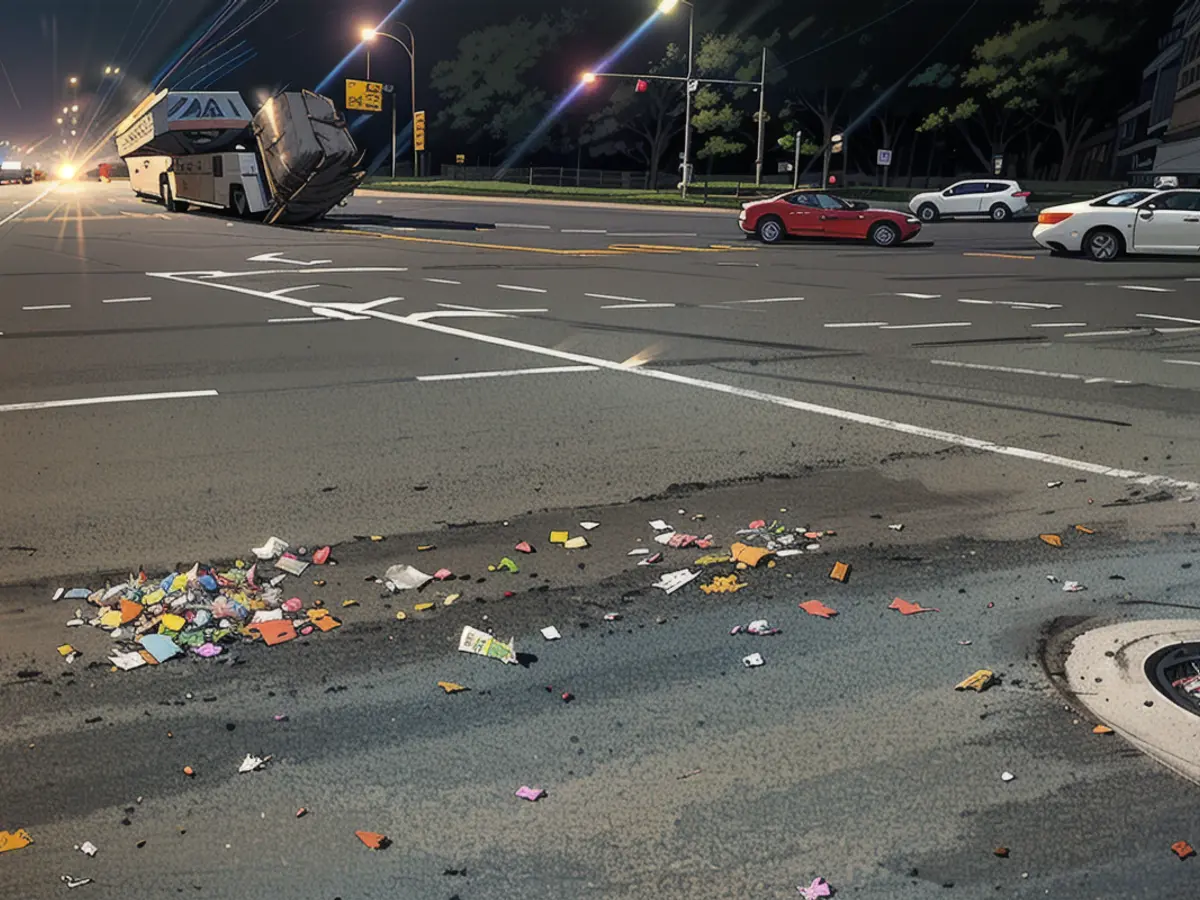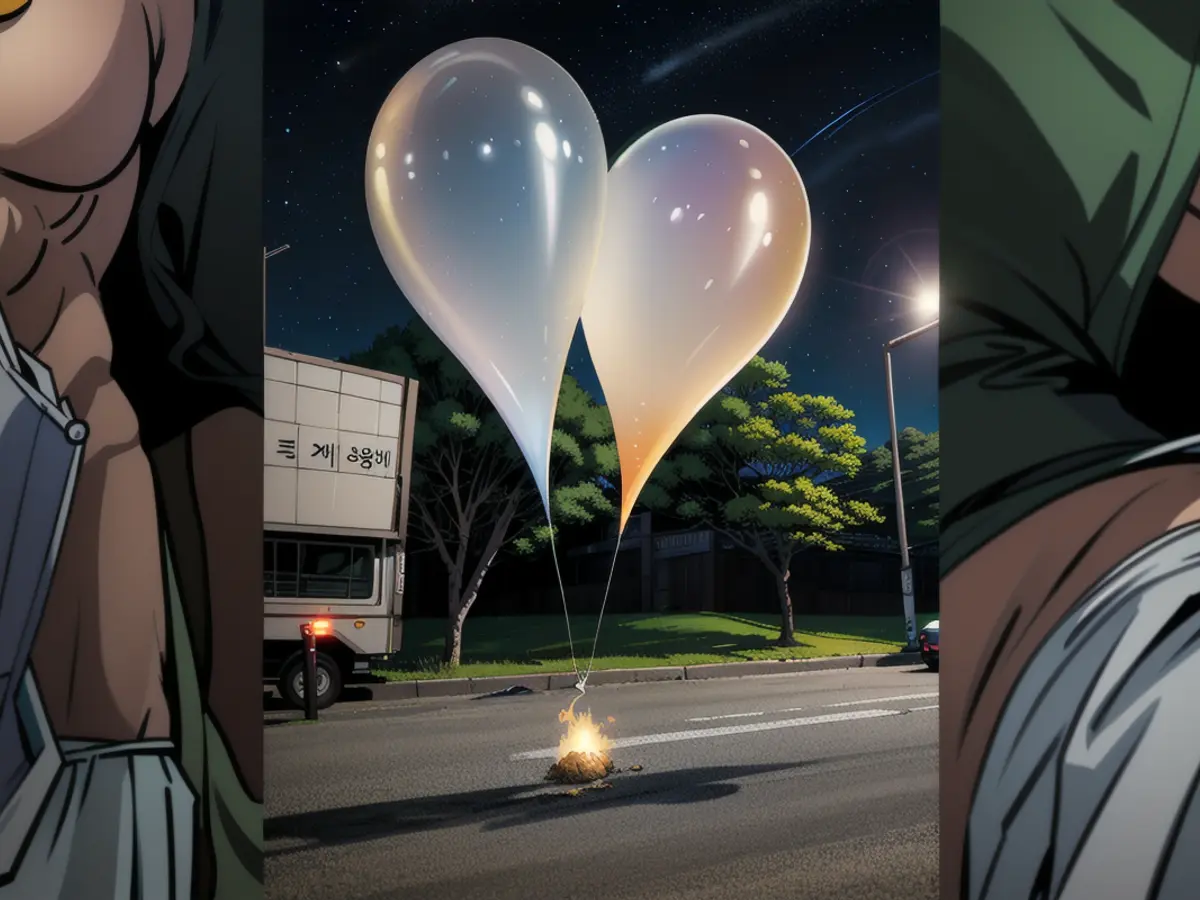North Korean balloons carry waste, causing pollution in South Korea.
Starting on Tuesday night, South Korean military officials started noticing a significant number of "huge balloons" arriving from the North. According to the country's Joint Chiefs of Staff (JCS), they have detected over 150 of these balloons by Wednesday morning.
Photographs from the JCS show large plastic bags, carried by two giant balloons, with some packages breaking and scattering pieces of plastic, sheets of paper, and what appears to be dirt on roads and sidewalks.
These balloons currently hold "trash and garbage" and are being assessed by government agencies. The JCS has also stated that they are collaborating with the United Nations Command.
The JCS condemned North Korea's actions, calling them a clear violation of international law and a threat to the safety of citizens in South Korea. They also emphasized that North Korea is fully responsible for these actions and warned them to stop these inhumane and low-level tactics.
Local governments in the northern Gyeonggi and Gangwon provinces have issued alerts to their residents about the "unidentified objects" and have advised against outdoor activities. The JCS has mentioned that there is a risk of these packages causing damage to residential areas, airports, and highways.
This incident was reported by North Korean state media KCNA and was retaliation against South Korean activists, who often send materials to the North. These materials include propaganda leaflets, food, medicine, radios, and USB sticks containing South Korean news and drama, which are all banned in the closed, totalitarian dictatorship of North Korea.
Activists in South Korea, including defectors from North Korea, have long sent these materials using balloons, drones, and bottles floating down the cross-border river, even after the South Korean government banned such actions in 2020.
Kim Kang Il, North Korea's Vice Minister of National Defense, said in a statement that scattering leaflets by use of balloons is a "dangerous provocation that can be utilized for a specific military purpose." He accused South Korea of using "psychological warfare" and declared that North Korea will retaliate.

Kim also criticized joint US-South Korea military drills and claimed that they are a provocation. The 2020 law that prohibited sending leaflets also banned loudspeaker propaganda broadcasts, which the South's military had used to conduct psychological warfare against North Korea until they removed their equipment after a 2018 summit between the two countries.
The South Korean government banned sending leaflets in 2020, but Park Sang-hak, a defector, has vowed to keep sending materials to his homeland. He has been sending them for 15 years, even after the ban, in an attempt to give North Koreans a glimpse of the outside world.
Earlier this month, Park's organization, Fighters for a Free North Korea, said in a statement that they had sent 20 balloons containing 300,000 leaflets, condemning Kim Jong Un and 2,000 USB sticks with K-pop and music videos.
North Korea has been almost completely cut off from the rest of the world for years, with extremely tight control over the flow of information. Any foreign material, including movies and books, is banned, and those caught with forbidden objects often face serious punishment, according to defectors.
This year, a South Korean research group released footage of North Korean teenagers sentenced to hard labor for watching and distributing K-dramas. North Korea's relationship with China has softened over the years, allowing some South Korean elements, like certain aspects of their pop culture, to seep into the hermit nation, especially in 2017 and 2018. However, as diplomatic talks fell apart, stricter rules were reimposed in the North.
For decades, North Korea has been a largely closed-off nation with strict rules surrounding the dissemination of information. Foreign materials such as movies and books are banned, with only a few state-sanctioned exceptions; those found with contraband face severe punishment, defectors revealed.

Read also:
- This will change in December
- Dikes withstand water masses so far - Scholz holds out the prospect of help
- Fireworks and parties ring in 2024 - turn of the year overshadowed by conflicts
- Attacks on ships in the Red Sea: shipping companies avoid important trade route
Despite the international condemnation and UN involvement, North Korea continues to launch pollution-causing balloons towards Asia, potentially affecting various countries in the region.
The world is witnessing a concerning environmental issue in Asia, as North Korea's waste-filled balloons contribute to pollution in multiple Asian nations.
Source: edition.cnn.com







